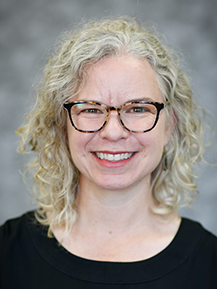Amanda Ingram
- Norman Treves Professor of Biology
- Professor of Biology, Div I Chair
- Hays Science Hall 117
- 765-361-6389
- ingrama@wabash.edu
- Curriculum vitae

Amanda Ingram joined the Wabash College faculty in 2004. Prof. Ingram’s research interests lie in plant systematics, the study of plant evolution and classification. Her work is currently focused on understanding the evolution of the lovegrasses, a group of approximately 400 species of grasses in the genus Eragrostis that are morphologically, anatomically, and ecologically diverse. She employs a variety of approaches to learn about these plants, including field work to collect material and explore the species’ distribution and ecology, and a range of laboratory techniques (e.g., DNA sequencing, anatomical study) that allow her to gather characters with which to build evolutionary trees. Her collecting trips have taken her to a number of fascinating ecosystems, ranging from the Namib Desert to the Ethiopian highlands to Australia’s Gold Coast. She also works with Wabash students on more local projects through her involvement in a nationwide consortium of conservation biologists working to preserve and understand native orchid species and the fungi upon which they rely.
Prof. Ingram is a native of Virginia’s beautiful Shenandoah Valley, and while she misses seeing mountains every day, she’s been working hard to embrace the rather less topographically interesting beauty found in Indiana’s natural areas. She also enjoys playing music and tending her urban “farm”.
Education
Ph.D. in Plant Biology, Cornell University
B.S. in Biology and Environmental Science, The College of William & Mary
Recent Course Offerings
BIO 101—Human Biology
BIO 102—Plants and Climate Change
BIO 112—General Biology II
BIO 224—Biology of Vascular Plants
BIO 351—Evolution of Populations
BIO 401—Senior Seminar (Polyploid Genome Evolution)
Recent Publications
Drury, S.A.M., A.G. Bost, L.M. Wysocki, A.L. Ingram. 2018. Encouraging science communication through deliberative pedagogy: a study of a gene editing deliberation in a nonmajors biology course. Journal of Microbiology & Biology Education 19 (1): 1-8.
Fisher, A.E., K.M. Hasenstab, H. Bell, E. Blaine, A.L Ingram, J.T. Columbus. 2016. Evolutionary history of chloridoid grasses estimated from 122 nuclear loci. Molecular Phylogenetics and Evolution 105: 1-14.
Duvall, M.R., J.T. Columbus, A.E. Fisher, A.L. Ingram, W.P. Wysocki, S.V. Burke, L.G. Clark, S.A. Kelchner. 2016. Phylogenomics and plastome evolution of the chloridoid grasses (Chloridoideae: Poaceae). International Journal of Plant Sciences 177 (3): 235-246.
Wysocki, W.P., L.G. Clark, S.A. Kelchner, S.V. Burke, J.C. Pires, P.P. Edger, D.R. Mayfield, J.K. Triplett, J.T. Columbus, A.L. Ingram, M.R. Duvall. 2014. A Multi-Step Comparison of Short-Read Full Plastome Sequence Assembly Methods. Taxon 63 (4): 899-910.
Bell, H. L., J.T. Columbus, and A.L. Ingram. 2013. Kalinia, a new North American genus for a species long misplaced in Eragrostis (Poaceae, Chloridoideae). Aliso 29: 85-95.
Honors & Awards
Indiana Humanities Quantum Leap grant (co-PI with Sara Drury): “Cultivating Our Gardens”
GLCA New Directions Initiative grant: “Mutual Benefits: Using Orchid / Fungal Mutualisms to Enhance Student / Faculty Collaborative Research”
National Science Foundation research grant: “Collaborative Research—Branching in Chloridoid Grasses: Phylogeny and Inflorescence Diversification” to J. Travis Columbus (Rancho Santa Ana Botanic Garden) and A. L. Ingram.
Podcast
![]() Ingram discusses the importance of biology, the study of lovegrasses and orchids, and the importance of it all.
Ingram discusses the importance of biology, the study of lovegrasses and orchids, and the importance of it all.
In another Podcast, Ingram talks about Urban Farming.
Ingram's LaFollette Lecture, Shaped by History
